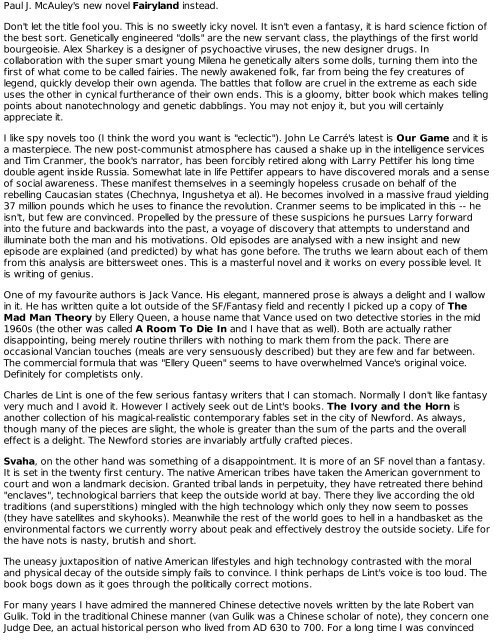Triffids Beard 2 - The Bearded Triffid
Triffids Beard 2 - The Bearded Triffid
Triffids Beard 2 - The Bearded Triffid
Create successful ePaper yourself
Turn your PDF publications into a flip-book with our unique Google optimized e-Paper software.
Paul J. McAuley's new novel Fairyland instead.<br />
Don't let the title fool you. This is no sweetly icky novel. It isn't even a fantasy, it is hard science fiction of<br />
the best sort. Genetically engineered "dolls" are the new servant class, the playthings of the first world<br />
bourgeoisie. Alex Sharkey is a designer of psychoactive viruses, the new designer drugs. In<br />
collaboration with the super smart young Milena he genetically alters some dolls, turning them into the<br />
first of what come to be called fairies. <strong>The</strong> newly awakened folk, far from being the fey creatures of<br />
legend, quickly develop their own agenda. <strong>The</strong> battles that follow are cruel in the extreme as each side<br />
uses the other in cynical furtherance of their own ends. This is a gloomy, bitter book which makes telling<br />
points about nanotechnology and genetic dabblings. You may not enjoy it, but you will certainly<br />
appreciate it.<br />
I like spy novels too (I think the word you want is "eclectic"). John Le Carré's latest is Our Game and it is<br />
a masterpiece. <strong>The</strong> new post-communist atmosphere has caused a shake up in the intelligence services<br />
and Tim Cranmer, the book's narrator, has been forcibly retired along with Larry Pettifer his long time<br />
double agent inside Russia. Somewhat late in life Pettifer appears to have discovered morals and a sense<br />
of social awareness. <strong>The</strong>se manifest themselves in a seemingly hopeless crusade on behalf of the<br />
rebelling Caucasian states (Chechnya, Ingushetya et al). He becomes involved in a massive fraud yielding<br />
37 million pounds which he uses to finance the revolution. Cranmer seems to be implicated in this -- he<br />
isn't, but few are convinced. Propelled by the pressure of these suspicions he pursues Larry forward<br />
into the future and backwards into the past, a voyage of discovery that attempts to understand and<br />
illuminate both the man and his motivations. Old episodes are analysed with a new insight and new<br />
episode are explained (and predicted) by what has gone before. <strong>The</strong> truths we learn about each of them<br />
from this analysis are bittersweet ones. This is a masterful novel and it works on every possible level. It<br />
is writing of genius.<br />
One of my favourite authors is Jack Vance. His elegant, mannered prose is always a delight and I wallow<br />
in it. He has written quite a lot outside of the SF/Fantasy field and recently I picked up a copy of <strong>The</strong><br />
Mad Man <strong>The</strong>ory by Ellery Queen, a house name that Vance used on two detective stories in the mid<br />
1960s (the other was called A Room To Die In and I have that as well). Both are actually rather<br />
disappointing, being merely routine thrillers with nothing to mark them from the pack. <strong>The</strong>re are<br />
occasional Vancian touches (meals are very sensuously described) but they are few and far between.<br />
<strong>The</strong> commercial formula that was "Ellery Queen" seems to have overwhelmed Vance's original voice.<br />
Definitely for completists only.<br />
Charles de Lint is one of the few serious fantasy writers that I can stomach. Normally I don't like fantasy<br />
very much and I avoid it. However I actively seek out de Lint's books. <strong>The</strong> Ivory and the Horn is<br />
another collection of his magical-realistic contemporary fables set in the city of Newford. As always,<br />
though many of the pieces are slight, the whole is greater than the sum of the parts and the overall<br />
effect is a delight. <strong>The</strong> Newford stories are invariably artfully crafted pieces.<br />
Svaha, on the other hand was something of a disappointment. It is more of an SF novel than a fantasy.<br />
It is set in the twenty first century. <strong>The</strong> native American tribes have taken the American government to<br />
court and won a landmark decision. Granted tribal lands in perpetuity, they have retreated there behind<br />
"enclaves", technological barriers that keep the outside world at bay. <strong>The</strong>re they live according the old<br />
traditions (and superstitions) mingled with the high technology which only they now seem to posses<br />
(they have satellites and skyhooks). Meanwhile the rest of the world goes to hell in a handbasket as the<br />
environmental factors we currently worry about peak and effectively destroy the outside society. Life for<br />
the have nots is nasty, brutish and short.<br />
<strong>The</strong> uneasy juxtaposition of native American lifestyles and high technology contrasted with the moral<br />
and physical decay of the outside simply fails to convince. I think perhaps de Lint's voice is too loud. <strong>The</strong><br />
book bogs down as it goes through the politically correct motions.<br />
For many years I have admired the mannered Chinese detective novels written by the late Robert van<br />
Gulik. Told in the traditional Chinese manner (van Gulik was a Chinese scholar of note), they concern one<br />
Judge Dee, an actual historical person who lived from AD 630 to 700. For a long time I was convinced


